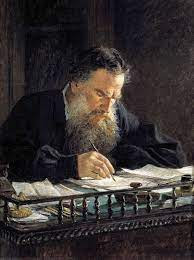Blavatsky, who wrote two articles about Tolstoy (The Science of Life, a lecture transcription review and Diagnoses and Palliatives, a review of his Kreutzer Sonata) and translated one of his short stories, The Imp and the Crust, felt a certain affinity with Tolstoy’s philosophical writings and spiritual ideas. Moreover, she sent him an inscribed copy of The Voice of the Silence, and he used eight sayings from them in his The Thoughts of Wise People for Every Day. According to Blavatsky :
''We have translated this rather lengthy fragment from the Report of Count Tolstoi’s superb lecture, because it reads like the echo of the finest teachings of the universal ethics of true theosophy. His definition of life in its abstract sense, and of the life every earnest theosophist ought to follow, each according to, and in the measure of, his natural capacities—is the summary and the Alpha and the Omega of practical psychic, if not spiritual life.'' (H.P. Blavatsky Collected Writings, Volume 8. THE SCIENCE OF LIFE [Lucifer, Vol. I, No. 3, November 1887, p. 240]
She ran a review of an article on Tolstoy by Raphael von Koeber "Leo Tolstoi and his Unecclesiastical Christianity" (Lucifer, September 1890) which states that :
For Tolstoi, Life means the striving of man after well being, after happiness, a happiness only to be attained, as we have seen, through the fulfillment of the commands of Jesus. Of these commands the deepest meaning is: true life, therefore also true happiness, consists--not in the preservation of one's personality, but--in absorption into the All, into God and Humanity. Since God is Reason, the Christian teaching may be formulated thus: subordinate thy personal life to reason, which demands of thee unconditional love for all beings.
And Blavatsky adds : ‘’Absolutely the same doctrine as that taught by Buddha and all other Initiates, Plato included. A fact recognised by Tolstoi, though not given its due significance by him.’’
Tolstoy’s concept of Universal Brotherhood was inspired by his reading of Schopenhauer and especially the ideas of Christian love, charity and fraternity in The Sermon of the Mount from the New Testament, although in A Letter to a Hindu he explains that : ‘’This thought appeared in most various forms at different times and places, with varying completeness and clarity. It found expression in Brahmanism, Judaism, Mazdaism (the teachings of Zoroaster), in Buddhism, Taoism, Confucianism, and in the writings of the Greek and Roman sages, as well as in Christianity and Mohammedanism.’’
A seminal architect of non-violent peace activism, in 1908, Tolstoy wrote A Letter to a Hindu outlining his belief in non-violence as a means for India to gain independence from colonial rule. In 1909, Gandhi read a copy of the letter when he was becoming an activist in South Africa. He wrote to Tolstoy seeking proof that he was the author, which led to further correspondence. It is interesting to note that Blavatsky had brief contacts with both men.


No comments:
Post a Comment